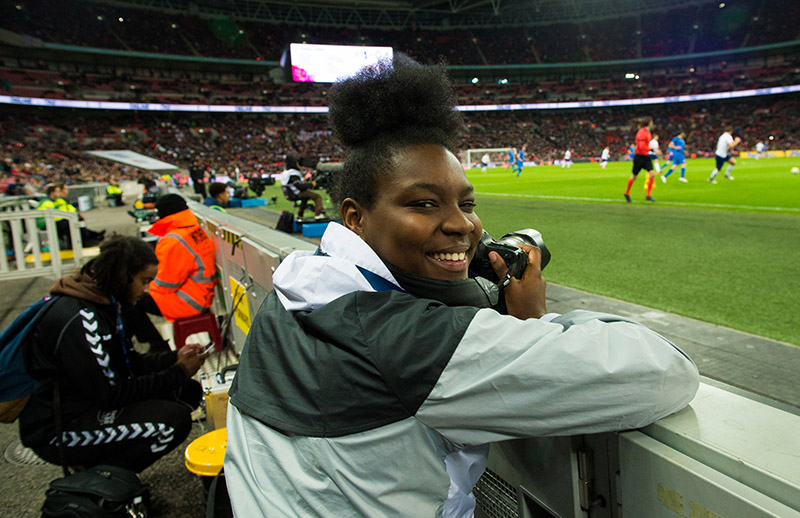
Many children have a natural obsession with the game and Football Beyond Borders are having huge success in channelling that enthusiasm into improving young people’s education
25 June ~ It’s nine o’clock on a Thursday morning during February half-term but, in the west London offices of analytics firm Football Radar, a group of secondary school students are taking their seats, notepads ready. The boys, aged between 11 and 16, will spend the morning learning about some of the different career options available in football – data analytics, journalism, social media – from people who work in the industry. They will then head to a local pitch to spend the afternoon playing football.
The day has been set up by Football Beyond Borders (FBB), an organisation that uses football to aid struggling students. FBB became an official charity in 2014 but its origins stretch back to 2009, when a university football team were on the train back from a match. The team’s captain, Jasper Kain, suggested they travel abroad over summer to “Try to do something socially conscious”. Under the name Football Beyond Borders they travelled to over ten countries, including becoming the first British football team to visit Syria. Then, after the London riots in 2011, everything changed.
“I was doing some youth work in south London and saw that the young people were marginalised, angry and didn’t have a constructive way of articulating that,” Kain says. “I also saw a swathe of young people who loved football, so I started some community sessions in Camberwell.” Kain immediately saw the impact, but quickly realised they would have more effect if they were properly structured.
He spoke to an old friend, Tom Bateman, who was a teacher at the Archbishop Lanfranc Academy in Croydon. Bateman had a group of Year 7 boys whose passion was football but they were already deemed problematic and at risk of exclusion. “Tom just said: ‘Can you come down and do something?’ And I said: ‘Well, let’s trial what I had as a kid – do your homework and you get to play football afterwards.’”
The FBB Schools project was born. Initially students would get football-based rewards if they did the right thing: turn up to homework club, get to play football afterwards; behave well for a certain time period, go on a football trip. The concept is simple but produced dramatic improvements in both behaviour and attendance. It’s something to which Bateman believes the power of football is key: “Football is the thing that the majority of teenage boys are willing to go to lengths for that they wouldn’t for other things,” he says. “The students that do well at school are the ones who have a clear purpose. FBB gave these students a purpose.”
The first hour of an FBB session is spent in the classroom, using football-based projects to improve students’ literacy and numeracy. Classes consist of writing up player profiles, developing persuasive writing by trying to answer the classic Lionel Messi v Cristiano Ronaldo argument or even improving spoken English by commentating over matches. The second hour is spent on the football pitch. Yet this isn’t just a reward, it’s key to developing the “soft skills” that will stay with the students throughout their lives, and central to FBB’s success.
“The football sessions are when the coaches really get to know the children,” Bateman says. “That’s when you see all their weaknesses and strengths. You suddenly see a leader come out because in that environment it’s OK to be supporting of the person next to you, or be loud and gee up your team. But it’s also OK to show anger and disappointment. They would have hidden that strength in the classroom.”
Having developed this philosophy, FBB is flourishing. It now works with 250 students across 18 programmes, including a number of girls’ groups. Participants have been involved in 31 per cent fewer incidents of bad behaviour, while there has been a 48 per cent improvement in teacher-assessed attitudes to learning. Beyond the stats, though, there is a bigger testament to the organisation’s success. It’s five years later and many of the boys from that initial class who were at risk of exclusion are in the Football Radar offices today, taking time out from studying for their GCSEs to plan for the future.
The next big challenge, though, is on the horizon: what do the young people do once they’ve left school? This is the first time FBB have handled that transition, but Kain has a plan. “The big thing for us is about connecting. I see FBB as a bridge between education and football. We use the huge amount of resources in football to support young people and harness all of the potential and ambition and aspiration football provides.”
There are two main stages to FBB’s development. They are due to take over a new site on a Brixton council estate, for which they are currently fundraising. It will be a learning hub with a football pitch and, from that site, the charity can provide long-term support for struggling young people, as well as giving them a place to come during school holidays. Then, in January 2019, they are looking at expanding into two new areas of the UK.
Much like the students it has worked with, you feel that FBB’s experiences over the past five years have given them the skills they need to take the next step. Should they be successful, the benefits of harnessing football as a positive tool for education will be felt across the country. Tom Hocking
This article first appeared in WSC 376, June 2018. Subscribers get free access to the complete WSC digital archive – you can find out more
Photos via FBB/FA
